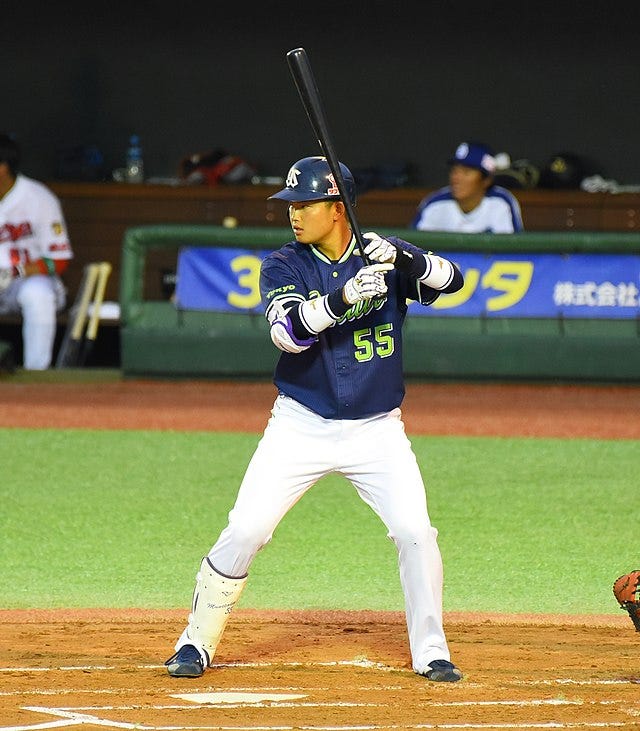To be or not to be... Japanese
Dear readers, I haven’t featured a sport story on Tokyo Calling so far because I know that it’s not everybody’s cup of green tea. I’m not a big sports fan myself. I watch a rugby union game once in a while, and the weekly football highlights (that’s soccer for my American and Aussie readers) and little else. But I love to read about sports: sport history, statistics, biographies, the lot. Sport, among other things, can tell us many interesting things about society and culture at large. That’s why today I’m featuring a story I read this morning. It’s by Robert Whiting, long-time resident of Japan and author of several great books about baseball.
This particular story is full of interesting data and statistics, but even more than baseball, it’s about Japan’s complicated relationship with foreigners and the slippery concept of Japaneseness. I hope you like it.
Pardon me if I am a little confused. The Japanese media has written breathlessly of Yakult Swallows Munetaka Murakami’s pursuit of the [single season] “Japanese home run record of 55,” held by Sadaharu Oh, this September.
‘世界の王超え日本選手最多56発’
“56 home runs, the highest number achieved by a Japanese athlete, surpassing the King of the World”
(This is a word play on Oh whose name literally means ‘king”))
But what exactly is a ‘Japan player record?’
Is it a record held by a Japanese — Oh who hit 55 in 1964 — as opposed to a record held by a gaijin [foreigner] like Wladimir Balentien from Curaçao, who hit 60 homers in 2013?
If so, what is the distinction?
Is Balentien’s 60 a ‘gaijin player record?’
Oh, also known as Wang Chen-chih on his ROC passport, is the Tokyo-born son of a Chinese immigrant from Taiwan and a Japanese mother. His father had left for Japan when the ROC still governed Mainland China and chose to retain his ROC citizenship.
Oh is a permanent resident of Japan but he has carried an alien registration card all his life, which he had to renew with periodic visits to the Immigration Office.
He retains his Chinese nationality because that was the wish of his father, but his ‘non-Japanese’ status has been an issue at different times in his life.
Oh was a high school pitching star who led Waseda Jitsugyo to glory in the 1957 High School Spring Championship Tournament at Koshien Stadium.
Before a nationwide TV audience, Oh pitched four complete games in four days in the final stages of the tourney, despite bleeding, infected blisters on his pitching hand that covered the baseball in blood, covering himself and his team in glory.
However, his Chinese nationality disqualified him as a member of the national high school team which represented Japan in international competition.
On the other hand, when he entered the Yomiuri Giants, after graduating from a Japanese high school, Oh was counted as a 日本選手Japanese player, not a 外人選手foreign player.
The rules now state a “domestic player” is defined as one who enters Nippon Professional Baseball (NPB) through the “new player” draft or has nine years of first-team service time, and no longer counts as an import.
But why should there even be such distinctions in regard to NPB statistics and in particular the home run record? It seems designed to keep gaijin in their place —
like Hawks pitchers refusing to throw to Tuffy Rhodes and Alex Cabrera when they were tied with Oh at 55 as the season drew to a close. Or Giants pitchers refusing to throw strikes to Randy Bass.
Balentien was luckily never subjected to that because he was so far ahead of the record pace that he broke it with many games to spare.
Of course, Oh suffered his own brand of discrimination.
Oh won a total of 15 home run titles in Japan,
nine MVP awards and
two triple crowns during his long career,
hitting a world record total of 868 career home runs.
Oh became a national hero when he broke Hank Aaron’s career home run mark. His achievement moved Prime Minister Takeo Fukuda to create and confer on him the country's first People's Honor Award (Kokumin Eiyo Sho). Yet some critics protested that he was not a "kokumin" (Japanese).
However, throughout his career on the Giants, Oh, curiously, was somehow less popular than third baseman Nagashima Shigeo, despite more impressive accomplishments.
Oh held 18 different batting records that were all seemingly unassailable, including 13 RBI titles, 2,170 career RBIs, a .634 lifetime slugging percentage, and 5,862 total bases, in addition, of course, to his equally unassailable home run marks,
while Nagashima held less than half that number, including four Japan Series MVPs, six Central League batting titles, 10 Opening Day home runs, and leading the CL in hits 10 years in a row.
It was Nagashima who always was known as “Mr. Giants” and “Mr. Puro-Yakyu” in Japan, not Sadaharu Oh. Nagashima was hired as field manager twice, compared to Oh’s one time, and it was Nagashima who was made a lifetime honorary chairman, of the Giants, not Oh.
Some said that fact that Nagashima was a pure-blooded Japanese whereas Oh, was not, may have had something to do with it.
Others said it was because Giants ‘owner’ Tsuneo Watanabe looked down on Oh because unlike Nagashima, Oh had not gone to college, lacked charisma, and thus in Watanabe’s view of the world never met the criteria for superstardom.
A generation after both men had ceased playing, the comparisons were still striking. Hall of Fame pitcher Kazuhisa Inao, appearing in a 2004 NHK television retrospective on the history of Japanese professional, would place Nagashima at the top of the NPB pantheon.
“Before Nagashima there was no one,” he said. “And after Nagashima there was no one.”
Apparently, not even 世界の王 (king of the world) Sadaharu Oh, for such was the emotional attachment to Japan’s Golden Boy.
It took a move to Kyushu and the Daiei/Softbank organizations for Oh to get the respect he deserves [as a manager, he led the Hawks to two Japan Series titles in 1999 and 2003. In 2006 he even led the national team to winning the first edition of the World Baseball Classic]
Summing up, the goalposts always seem to be moving, and yet it’s nice to see Oh now treated as a full-blown Japanese.
I guess.
Here’s Whiting’s original post






